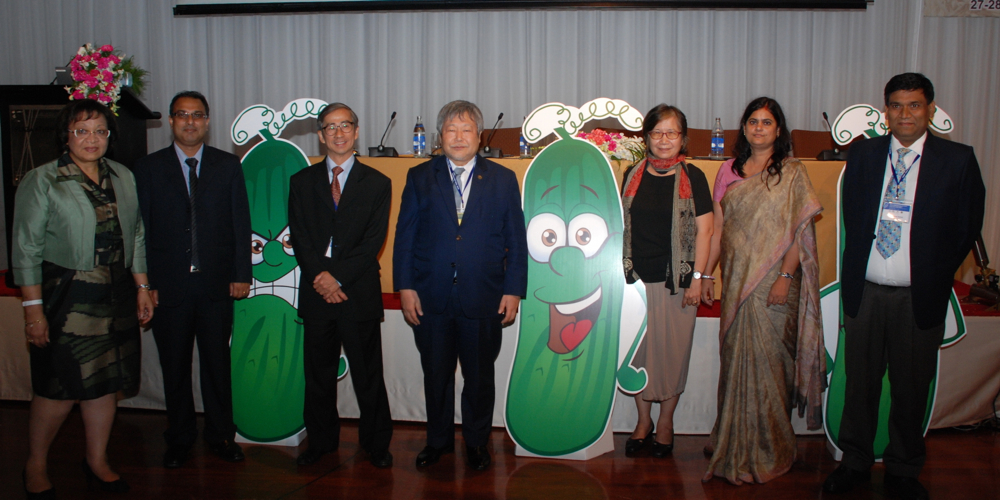"The issue of food loss and
waste is important to our agenda at AIT."
- Interim AIT President Prof. Worsak Kanok-Nukulchai
The Asian Institute of Technology, Food and Agriculture Organization
(FAO) of the United Nations and other international partners this
week collaborated to combat the huge amount of food that goes to
waste across the Asia-Pacific region.
Kicking off the region-wide ‘Save Food Asia-Pacific Campaign’ in
Bangkok, Thailand on August 27-28 at the High-Level Multi-Stakeholder
Consultation on Food Losses and Food Waste in Asia and the Pacific
Region, 130 participants representing 20 countries, including four
agriculture ministers, pledged to take action.
Officially launching the Campaign, Mr. Hiroyuki Konuma, Assistant
Director-General, Regional Representative for Asia and the Pacific, FAO
said: "The Save Food Asia-Pacific Campaign seeks to raise awareness
about the high levels of food losses – particularly post-harvest losses
– and the growing problem of food waste in the region.”
According to the FAO, the world produces enough food to meet the demand
of its current population of 7 billion. Still, one in eight people go
hungry every day. Approximately 35 per cent of food is lost between
harvest and distribution in the Asia-Pacific. In 2012, the region was
home to 536 million hungry people, or 62 per cent of humanity’s
undernourished.
"The FAO estimates that if the food wasted or lost globally could be
reduced by just one quarter, this would be sufficient to feed the 870
million people suffering from chronic hunger in the world," Mr. Konuma
said.
The Campaign outlines
Strategic Actions the region stakeholers can take to
save food from “farm to table” by limiting post-harvest losses and
consumer waste. It defines “loss” as food which does not make it to the
market from harvest and “waste” is food thrown away by consumers,
restaurants and supermarkets.
"The issue of food loss and waste is important to our agenda at AIT,"
Interim AIT President Prof. Worsak Kanok-Nukulchai said in his opening
address.
The President told the international conference that AIT takes a
cross-cutting and multi-disciplinary approach to the issue under its
current research focus of sustainable development in the context of
climate change. It is also studied scientifically by several fields of
study at AIT, as well as at the recently opened Asian Center of
Innovation for Sustainable Agriculture Intensification (ACISAI).
AIT Vice President for Research Prof. Kanchana Kanchanasut reiterated
AIT’s commitment to the Campaign, saying the Institute would provide
the necessary support for capacity building through education,
systematic research and trainings.
ACISAI Directors Dr. Prabhat Kumar and Dr. Abha Mishra, as well
as AIT's Dr. Anil Kumar Anal, Assistant Professor Food Engineering
and Bioprocess Technology Program, and Dr. Wenresti Glino
Gallardo, Associate Professor and Thematic Area Leader Aquaculture
and Aquatic Resources Management Program, initiated the partnership
with FAO Regional Office for Asia and the Pacific.
Addressing the Consultation's opening session, Thailand's Deputy Prime
Minister and Minister of Agriculture and Cooperatives Mr. Yukol
Limlamthong said, "Within the context of Asia and the Pacific Region,
more effort is needed to raise global awareness of the critical issue
of food losses and particularly post-harvest losses as well as food
waste, which is increasing nowadays."
The deputy PM added: "The Government of Thailand is deeply committed to
working with FAO and with other partners and stakeholders in the region
to promote the security of the region and also of the world."
“Today over 800 million people will go to bed hungry,” renowned Indian
scientist Dr. M.S. Swaminathan said in a keynote address.
The geneticist, who is widely recognized as one of the fathers of
India’s Green Revolution in the 1960s, outlined the hard facts.
One-third of all food produced on earth is lost or wasted. At the
global level, a staggering 1.3 billion tonnes of food is lost. This
food could meet the nutritional needs of over 3 billion people, he
said.
The Chairman of the UN High Level Panel of Experts on Food and
Nutritional Security welcomed the campaign, saying the results would be
of importance for achieving the goal of zero hunger.
Overall, he recommended that industrialized countries should cut down
on waste at the consumption level, while developing countries should
pay greater attention to reducing food losses and waste at the
production and post-harvest management stages.
He also praised AIT role as an academic partner of the Campaign. “AIT
is number one in technology,” he said, highlighting the need for
appropriate technologies. “There is no time to waste,” Dr. Swaminathan
warned, as the threats to human food security are great.
In a
Joint Communiqué released at the end of the two-day
Consultation, international delegates said they were united to ensure
food security and economic and social development and environmental
sustainability in the Asia and Pacific Region by promoting joint
actions to reduce food losses and food waste. The Consultation
came to a consensus on a number of
Strategic Actions for the Campaign.
Read news: FAO Regional Office
for Asia and the Pacific
Further details can be read at this link: http://www.fao.org/news/story/en/item/195565/icode/


